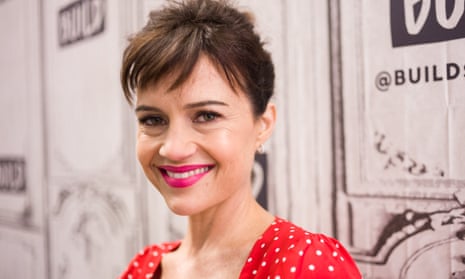Carla Gugino has seen the headlines, too: femme fatale, screen siren, bombshell. “I don’t really relate to that much,” she says, on a recent morning at a Manhattan cafe. “Maybe an emotional bombshell.”
Gugino, 48, has three decades of film, television and theatre under the belt of her high-waisted jeans. An actor of variety and intellect, who often channels sexuality like some high-voltage current, she is currently starring in Alice Birch’s Anatomy of a Suicide at the Atlantic Theater. She is described in the play – originally staged at the Royal Court in London in 2017 – as “the most beautiful thing I’ve ever seen”. In the cafe, in a stripy turtleneck and yesterday’s mascara, her hair pulled into a funny sort of pompadour, bent over a cup of herbal tea (isn’t that what all bombshells drink?), she arguably is.
If you know Gugino from children’s flicks (Spy Kids) or comic-book adaptations (Sin City, Watchmen) or disaster movies (San Andreas), you could be forgiven for wondering what she is doing in an avant garde off-Broadway drama. So here is what you should also know: in 2004, she made her Broadway debut, in Arthur Miller’s After the Fall, playing Maggie, the turbulent, unforgiving Marilyn Monroe-inspired role. “I felt like I was home,” she says. “And from that moment, I realised, ‘Oh, this is a huge. This has to be something I do for the rest of my life.’” She has returned to theatre every few years including in Eugene O’Neill’s Desire Under the Elms, and in Athol Fugard’s The Road to Mecca. Seven years ago, she and her partner, the writer and director Sebastian Gutierrez, relocated to Manhattan. So when she does a play, she can usually walk to work.

Anatomy of a Suicide spoke to her, Gugino says, viscerally and intellectually. It simultaneously tracks three generations of women in three time periods (roughly: the 1970s, the 2000s, the 2030s), with many lines spoken in unison, which means that it demands extreme technical rigour. Playing a woman who wants to die makes emotional claims, too.
“It’s a really tricky place to live in,” she says. “Because it costs you, this play. And it should.” She has been reading accounts of suicidal ideation and listening to podcast interviews, working toward someone who “is always trying to crack life. She just can’t. And I relate to that. Life is really hard,” she says. “All of us have those moments when you just don’t know what your value is here and what the value of staying is,” she says. “So for me, there were personal elements. She just spoke to me, this woman.”
Her character, Carol, has a perilous kind of magnetism. She fascinates people even – or especially – when she doesn’t mean to. “God we were all so in love with you in school,” another character says. “I know literally three girls who started smoking because you used to smoke.” Gugino’s other current roles capitalise on that allure like Daisy, the thief she plays on the cable noir Jett (in televisual limbo now that Cinemax has killed its original programming division), or Stella, which she will act opposite Audra McDonald’s Blanche and Bobby Cannavale’s Stanley in a Streetcar Named Desire revival this summer.

She calls sexuality “a primal part of who we are” and “part and parcel of who I am” and she’s interested in exploring it in her work, she says, “because as a woman, I find it to be a huge centre of our power that has been misused and misrepresented a lot of the time”. (She doesn’t quite put a movie like Sin City in that category, but she recognises that its sex scenes didn’t come from character.) Still, she wished she weren’t asked about it quite so often because it speaks to a certain American puritanism. “I find it so interesting that you can see a nipple shot off, but you can’t see a woman walking from the bed to the bathroom naked without being commented on.”
The violence in Anatomy of a Suicide is psychological, self-inflicted. Before each show, she prepares by running lines and listening to a piece of music that moves her closer to Carol, “a lullaby of death, basically”, she says. She and the rest of the cast take three breaths together, a ritual the director Lileana Blain-Cruz developed. After the show, the cast take three more breaths and then she plays a song “that kind of brings me joy or makes me laugh or makes me want to dance”, something to help her shake it off.
Every day, as she walks to work, she thinks about what she needs to accomplish that day, what her character will undergo. “And I can feel,” she says, “that part of me that’s like, ‘Don’t make me go there.’” But to know that she can? “Exhilaration.”
